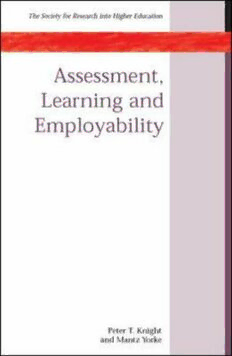
Assessment Learning and Employability (Society for Research Into Higher Education) PDF
258 Pages·2003·2.3 MB·English
Most books are stored in the elastic cloud where traffic is expensive. For this reason, we have a limit on daily download.
Preview Assessment Learning and Employability (Society for Research Into Higher Education)
Description:
What is assessed gets attention: what is not assessed does not. When higher education is expected to promote complex achievements in subject disciplines and in terms of 'employability', problems arise: how are such achievements to be assessed? In the first part of the book, it is argued that existing grading practices cannot cope with the expectations laid upon them, while the potential of formative assessment for the support of learning is not fully realised. The authors argue that improving the effectiveness of assessment depends on a well-grounded appreciation of what assessment is, and what may and may not be expected of it. The second part covers summative judgements for high-stakes purposes. Using established measurement theory, a view is developed of the conditions under which affordable, useful, valid and reliable summative judgements can be made. One conclusion is that many complex achievements resist high-stakes assessment, which directs attention to low-stakes, essentially formative, alternatives. Assessment for learning and employability demands more than module-level changes to assessment methods. The final part discusses how institutions need to respond in policy terms to the challenges that have been posed. The book concludes with a discussion of how institutions can respond in policy terms to the challenges that have been posed. Assessment, Learning and Employability has wide and practical relevance - to teachers, module and programme leaders, higher education managers and quality enhancement specialists.
See more
The list of books you might like
Most books are stored in the elastic cloud where traffic is expensive. For this reason, we have a limit on daily download.
